Negotiation Skills Training Course
Negotiation Skills Course Singapore
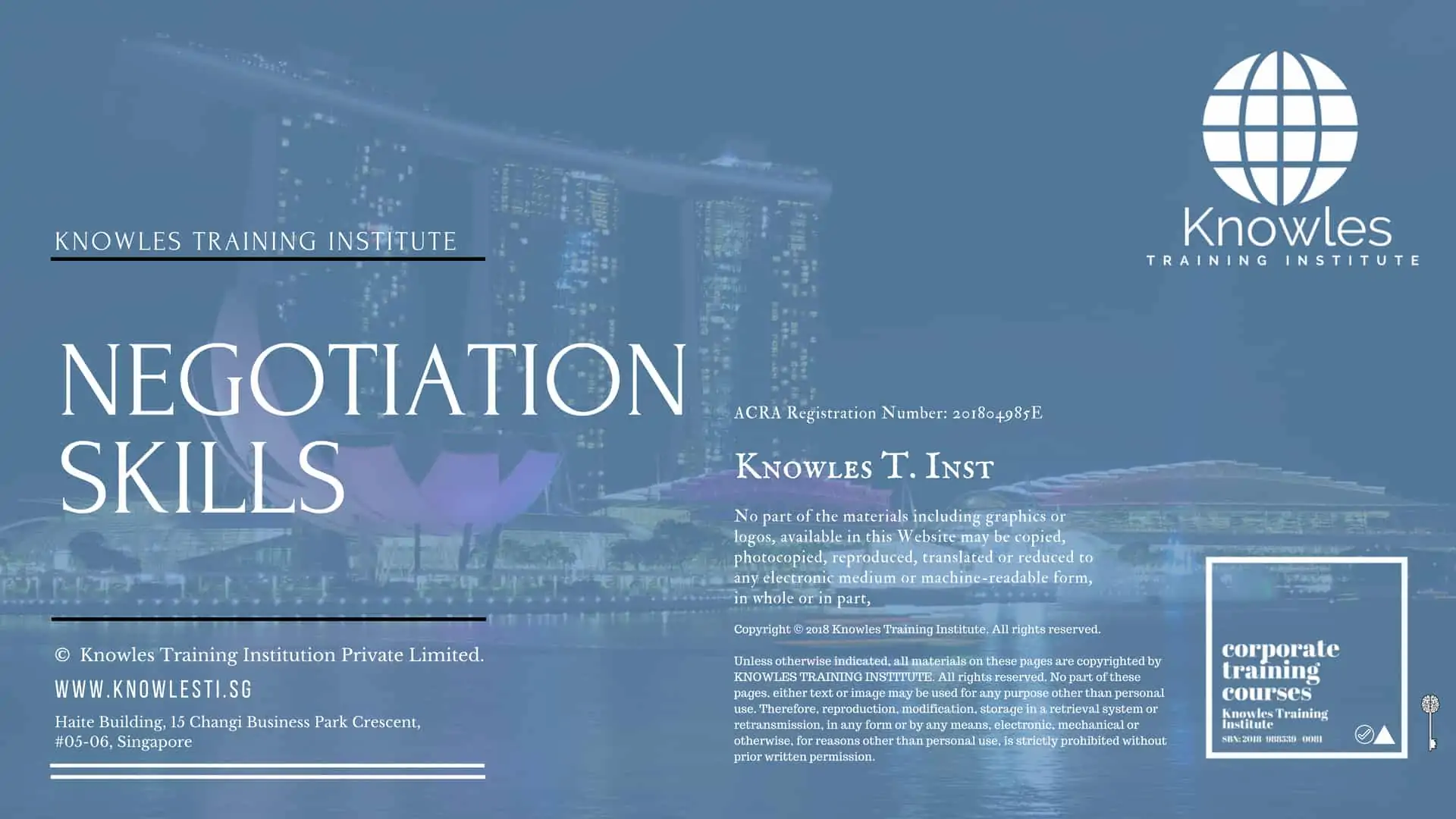
About This Negotiation Skills Training Course
Negotiation Skills Course In Singapore
If you are good at negotiating, there is a high chance that you can get far in your career. Having the skill to resolve differences is essential in the workplace because a lot of ideas and personalities could arise. Here, we will discover what it takes to be a good negotiator and what you can do to master it.
Although people often think of board-rooms, suits, and million-dollar projects when they hear the word “negotiation,” the fact is that we negotiate all the time.
For example, have you ever;-
- Decided on where to eat with a group of friends?
- Decided on chores with your family?
- Asked your boss for a raise?
These are all situations that involve negotiating! This negotiation course will give participants knowledge of the phases of negotiation, tools to use during a negotiation, and techniques to build win-win solutions for all those involved.
Who Should Attend This Negotiation Skills Workshop
This Negotiation Skills workshop is ideal for anyone who would like to gain a strong grasp and improve their Negotiation Skills.
All Staff Within An Organisation
Managers
Team Leaders
Executives
Assistants
Officers
Secretaries
Group Size For This Negotiation Skills Training Program
The ideal group size for this Negotiation Skills course is:
Minimum: 5 Participants
Maximum: 15 Participants
Course Duration For This Negotiation Skills Course
The duration of this Negotiation Skills workshop is 2 full days. Knowles Training Institute will also be able to contextualised this workshop according to different durations; 3 full days, 1 day, half day, 90 minutes and 60 minutes.
2 Full Days
9 a.m to 5 p.m
Negotiation Skills Course Benefits
Below Is The List Of Course Benefits Of Our Negotiation Skills Course
Negotiation Skills Course Objectives
Below Is The List Of Course Objectives Of Our Negotiation Skills Course
- Understand The Fundamental Of Negotiations, The Phases Of Negotiations, And The Skills Needed For Successful Negotiating
- Understand And Implement Basic Negotiating Theories: WATNA, BATNA, WAP, And ZOPA
- Set The Grounds For Negotiation
- Identify What Knowledge To Share And What To Hold To Yourself
- Possess Basic Bargaining Methods
- Implement Strategies For Identifying Mutual Gain
- Learn How To Reach Consensus And Set The Terms Of The Agreement
- Deal With Personal Attacks And Other Complicated Issues
- Use The Negotiating Process To Resolve Everyday Obstacles
- Negotiate On Behalf Of Someone Else
Course Content For This Negotiation Skills Training Course
Below Is The List Of The Course Content Of Our Negotiation Skills Training Course
Negotiation Course Singapore – Part 1: Understanding Negotiation
- Different Types of Negotiations
- The two primary types of negotiations require different approaches.
- The Three Phases
- The three phases of a negotiation
- Skills for Successful Negotiating
- Without certain factors, negotiations will be difficult but not impossible. The need for negotiation arises because neither party will be able to get what they want.
Negotiation Course Singapore – Part 2: Preparing Yourself For The Negotiation
Like any other challenging task, negotiation needs preparation. Before you start negotiating, you need to establish what you hope to get out of it, what you would settle for, and what you consider unacceptable. You would also need to prepare yourself personally.
- Establishing Your WATNA and BATNA
- In some negotiations, the parties are guided by their opinions about what they think are the options for a successfully negotiated agreement.
Often, people have an unreliable idea of what these alternatives are, as they are unwilling to make decisions because they believe that they can do it just as well without having to negotiate. - If you don’t have a definite sense of your WATNA – Worst Alternative to a Negotiated Agreement, and BATNA – Best Alternative to a Negotiated Agreement, you will negotiate poorly based on incorrect ideas about what you should expect without an agreement.
- In some negotiations, the parties are guided by their opinions about what they think are the options for a successfully negotiated agreement.
- Identifying Your WAP
- In any negotiation, you must keep your WAP (Walk Away Price) to yourself, especially if it is significantly less than your original offer.
- Identifying Your ZOPA
- In the negotiation for the used car, everyone should feel good about the results.
- Even though the parties were hoping for a better outcome, both got a better price than their WAP. The ZOPA – Zone Of Possible Agreement, is the field in which the final price will sit, and within that ZOPA, you will end up with a price closer to their WAP than yours.
- Personal Preparation
- One of the ways to relieve some of the tension you may be feeling before a discussion is to note to yourself that there is nothing to be afraid of.
Negotiation Course Singapore – Part 3: Laying The Groundwork For Negotiation
We study other aspects of preparation: setting the time and place, establishing a common ground, and creating a negotiating framework. At a stage this early, it is crucial to have certain principles in place. By allowing them to be compromised, then you have put yourself in a spot where you are considered prey for hostile negotiators. Getting the foundation set in place seems like a rule, but it is the initial stage of negotiations, hence, as much a part of the arrangements as any others.
- Setting the Time and Place
- Setting the time and place will give you an edge in a negotiation.
- Establishing Common Ground
- Sometimes, the people involved in a negotiation begin by addressing the issue on which they are farthest apart.
- Creating a Negotiation Framework
- Both sides in a negotiation bring their frame of reference based on their experience, values, and goals.
- The Negotiation Process
- Preparation- Opening Position Bargaining-Movement-Closing
Negotiation Course Singapore – Part 4: Exchanging Information
The first stage in a negotiation involves an exchange of knowledge and information. Both parties would state their positions on the issues being addressed in a non-confrontational manner. The tricky part of this stage is deciding what to disclose and what to keep. The “poker” metaphor for negotiating is a great one as it describes the way that everyone will want to “allow” everyone to think accurately. The knowledge and information you share with your negotiating counterpart will enable them to read a certain measure about your position. You cannot negotiate aimlessly, after all. However, too much information given away can come back and attack you.
- Getting Off on the Right Foot
- Before you get to work, it is a great idea to participate in a little small talk with the others involved in the negotiation.
- What to Share
- When you start negotiating, you don’t want to give a detailed statement about your position on specific issues.
- What to Keep to Yourself
- Holding back information can be a complicated business.
Negotiation Course Singapore – Part 5: Bargaining
This section of the negotiation course explains what to expect when you begin to negotiate and what to do if you happy to reach an obstacle. It also explains some simple bargaining methods used by trained negotiators.
- What to Expect
- In addition to understanding the demands, targets, and requirements that might impact the other party, you might want to attempt to get an idea of their usual negotiating approach.
- Techniques to Try
- Some of these methods are what you can expect to face when bargaining with a vendor, but that will not hold sophisticated business people from using them. The crucial thing is to understand them and be prepared to answer to them if they are used against you in a negotiation. When you recognize the method when it is used, you can turn them to your advantage in a pressurized negotiation environment.
- How to Break an Impasse
- The dictionary says an impasse (a noun) that describes: “a situation in which no improvement is possible, especially because of conflict; a deadlock.”
Negotiation Course Singapore – Part 6: Mutual Gain
In the classic book Getting to Yes, Roger Fisher and William Ury explain that most negotiations are not as effective or as successful as they might be as people usually tend to argue about their positions and not their interests. When the parties in the negotiation commit themselves to a position, they feel that shifting their position signifies failure. What are we able to get out of the negotiation that will promote our curiosities? That is the question that should lead a negotiation toward achieving mutual gain.
- About Mutual Gain
- A powerful tool to making the common gain approach work is to concentrate everyone’s focus on their interests, not positions. Everyone wants to create an environment of respect and order in the schools.
- Creating a Mutual Gain Solution
- Forming a common gain result requires some activities that are usually not associated with negotiations
- What Do I Want?
- Start of with dentifying what you personally want out of the negotiation.
- What Do They Want?
- Next, identify the person that you are conflicting with wants.
- What Do We Want?
- When you have distinguished the wants and needs of both sides, look for areas of overlap.
Negotiation Course Singapore – Part 7: Closing
The last phase of a negotiation is a time for reaching mutual consent and forming agreement. Hard work in this phase will ensure that the negotiation achieves its wanted results. Closing a negotiation can mean 2 different things: 1, it may be a question as to how we can bring different ideas to a commonly agreed outcome. The second possibility view of ‘closing’ is what means negotiating parties can use to recognize or formalize the idea that agreement has been relinquished. Recognizing that parties have reached an agreement will be easy. One can ask the other, “Have we reached an agreement, then?” The parties can shake hands, make an announcement, or better, sign a document. The issue is that each has to make it apparent to the other negotiators that a commonly agreed conclusion has been achieved.
- Reaching Consensus
- People have various ideas about what consensus is. When used in negotiations, consensus usually involves substantive understanding on essential issues.
- Building an Agreement
- Building an agreement takes a particular skill — the capacity to translate generalities into specifics.
- Setting the Terms of the Agreement
- We are familiar with what can possibly happen when the terms of an agreement are not spelled out.
Negotiation Course Singapore – Part 8: Dealing With Difficult Issues in Negotiation
Usually, most people are willing to negotiate in good faith. They don’t resort to tricks or intimidation. Take note, every once in a while, you will meet people who are the kind that takes a less principled approach. You will need to prep yourself to deal with people who do not want to play fair. It is not absurd to prep yourself for the likelihood that other people will try to break and bend the rules, especially when these rules are unwritten. It is simply good to be realistic. Some people are selfish, however, if you know how to manage them, it is not the end of the world.
- Being Prepared for Environmental Tactics
- Using environmental techniques to gain an advantage in a negotiation doesn’t happen that often, but negotiators need to be prepared for it.
- Dealing with Personal Attacks
- Negotiation will be more productive if you focus on problems and not personalities.
- Controlling Your Emotions
- Identifying and controlling emotions is a powerful tool of “emotional intelligence.”
- Deciding When It’s Time to Walk Away
- It would be amazing if the environment of every negotiation was warm and friendly, but is it usually not how things work in the real world.
Negotiation Course Singapore – Part 9: Negotiating Outside the Boardroom
Negotiating is not something that takes place in the office with powerful forces at the table. People have free and easy -informal negotiations everyday — with their colleagues, friends and even family members.
- Adapting the Process for Smaller Negotiations
- Some of the fundamentals of negotiation can be valuable in everyday situations.
- Negotiating via Telephone
- The phone can be a useful tool for negotiations, especially when the two parties find it hard to meet in person.
- Negotiating via Email
- Emails are also an effective method of communication, but it has some inherent limitations.
Negotiation Course Singapore – Part 9: Negotiating on Behalf of Someone Else
When you begin a negotiation on behalf of someone else, you are required to have a clear idea of your Walk Away Price – WAP, and the bargains you have the permit to make. You are required to be sure you understand the issues well enough to respond to hard questions that will come up in the negotiation.
- Choosing the Negotiating Team
- An important part of leading a team of any kind is giving information. Teams require information to thrive.
- Covering All the Bases
- Some negotiations can be complicated that it is difficult for one person to learn all the issues.
- Dealing with Tough Questions
- What are the possible ways you can respond to questions that you refuse to answer.
Negotiation Skills Value Added Materials
Each participant will receive the following materials for the Negotiation Skills course
Negotiation Skills Learner’s Guide
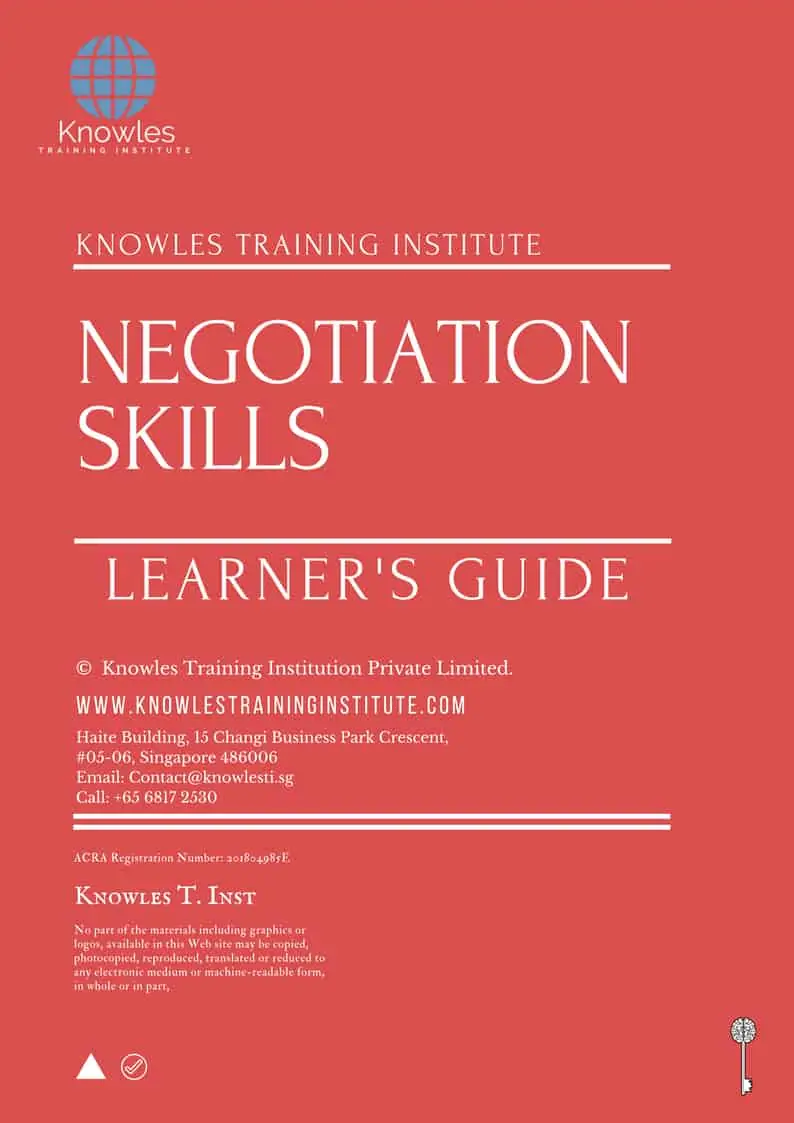
Negotiation Skills Key Takeaways Notes
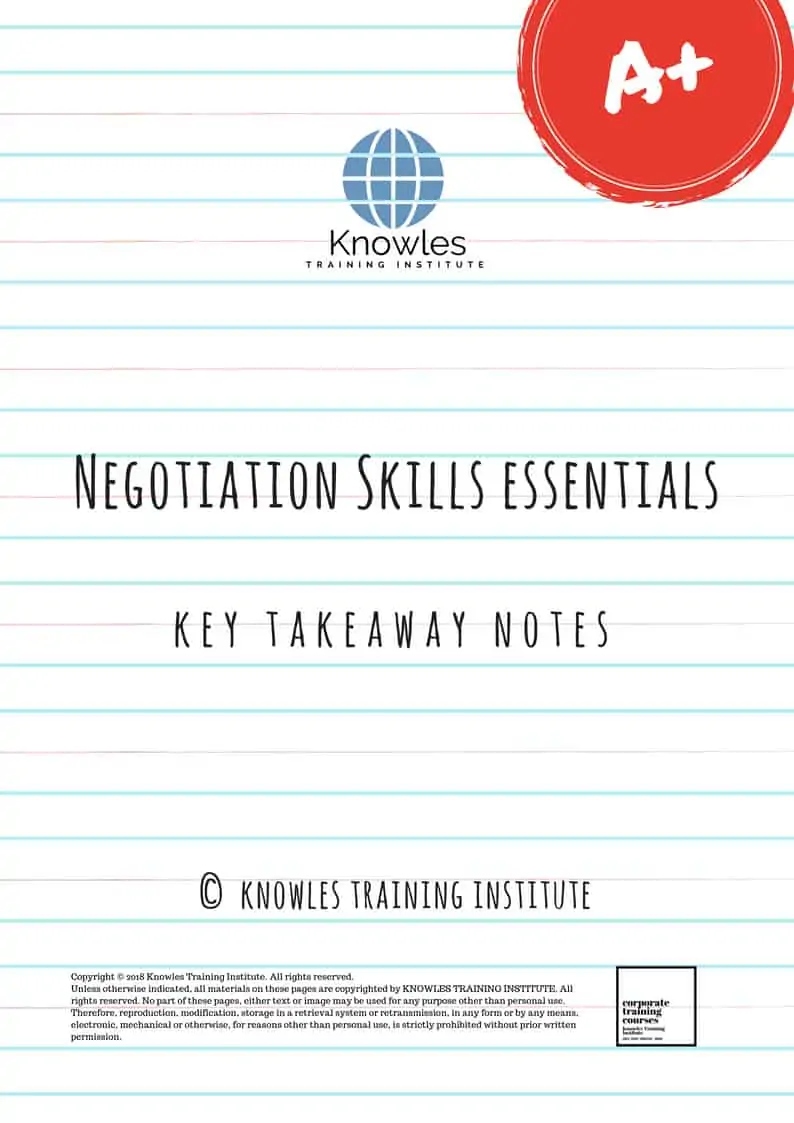
Negotiation Skills Essentials Ebook

Negotiation Skills Course Handouts
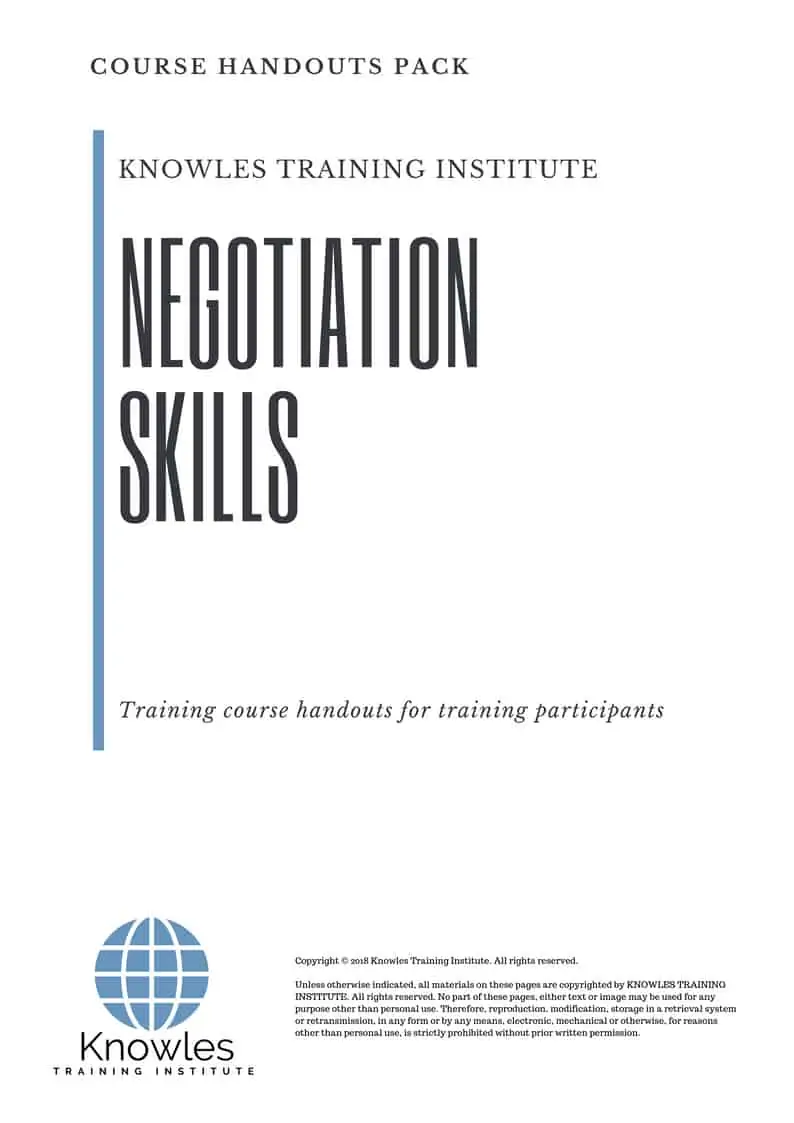
Negotiation Skills 30-Day Action Plan
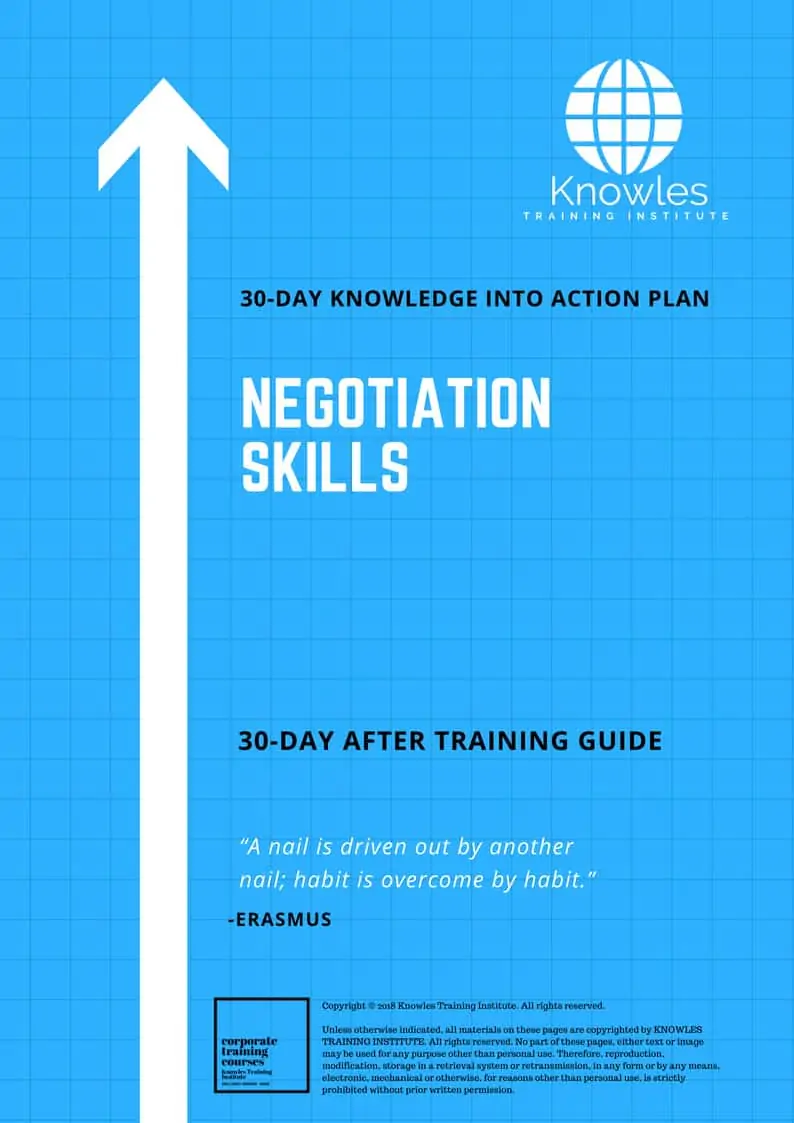
Negotiation Skills MindMaps Pack
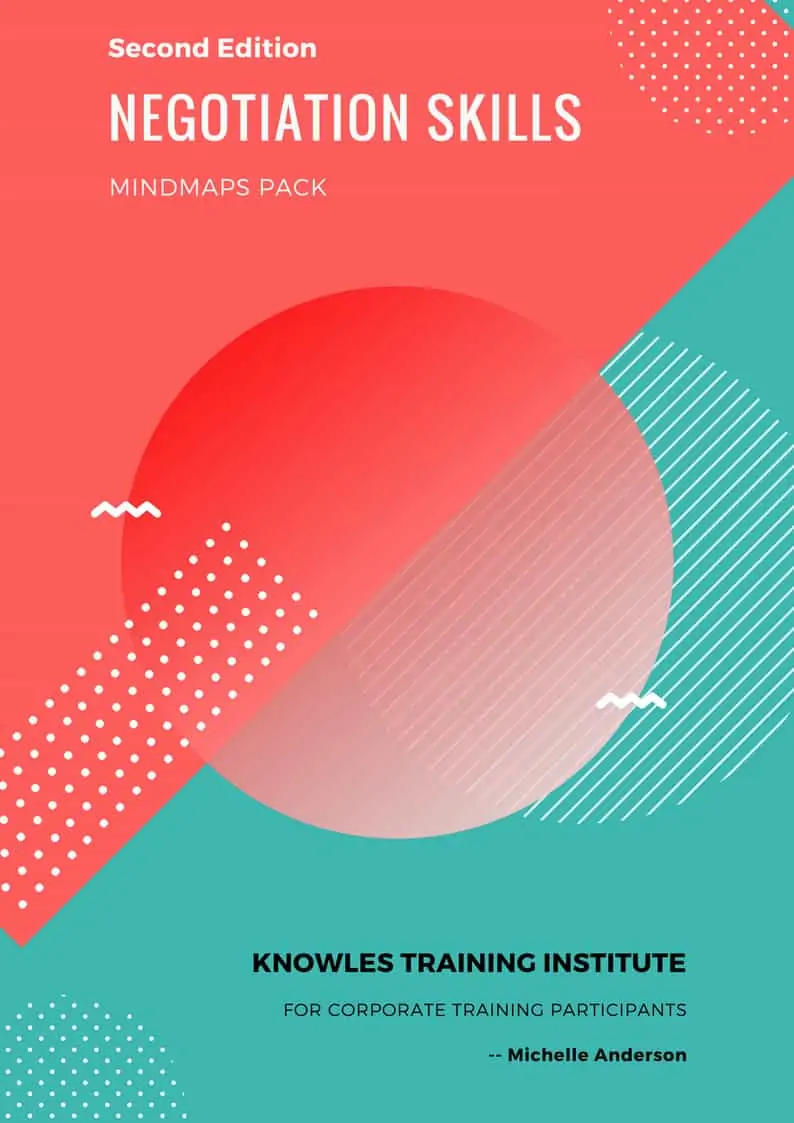
Negotiation Skills PPT Slides Used During Course
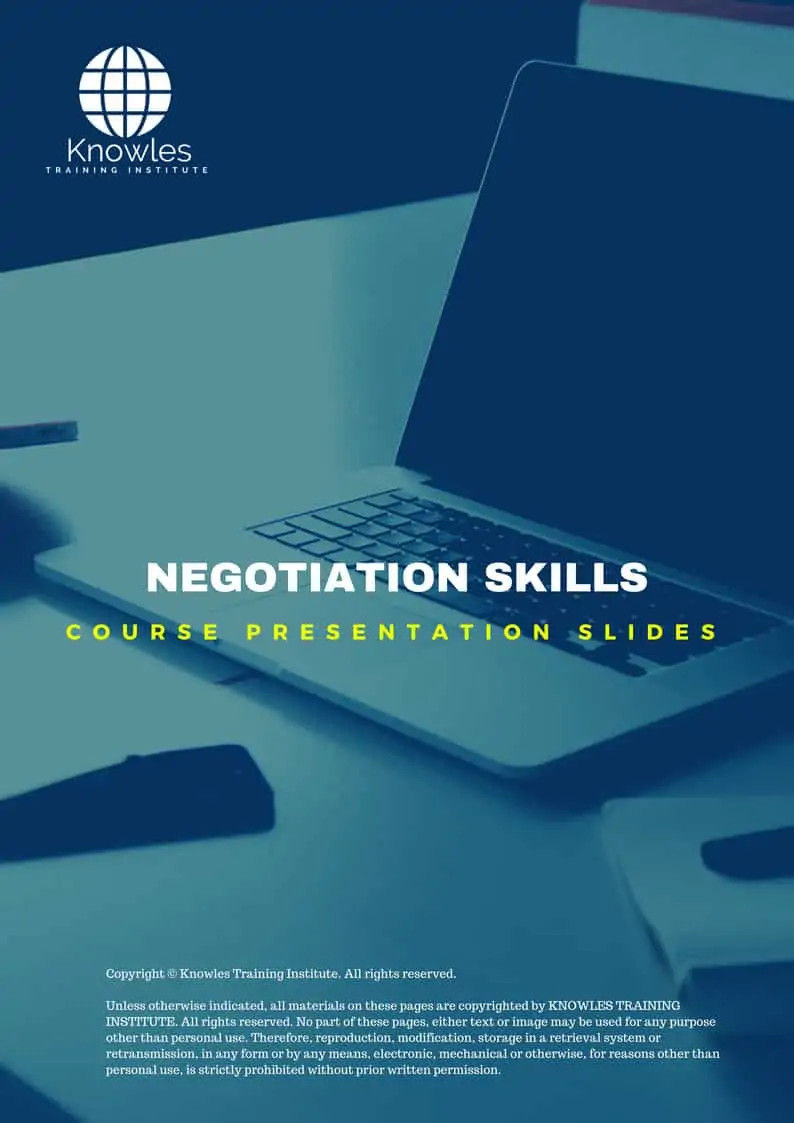
Negotiation Skills Long-Term Memory Flashcards Pack
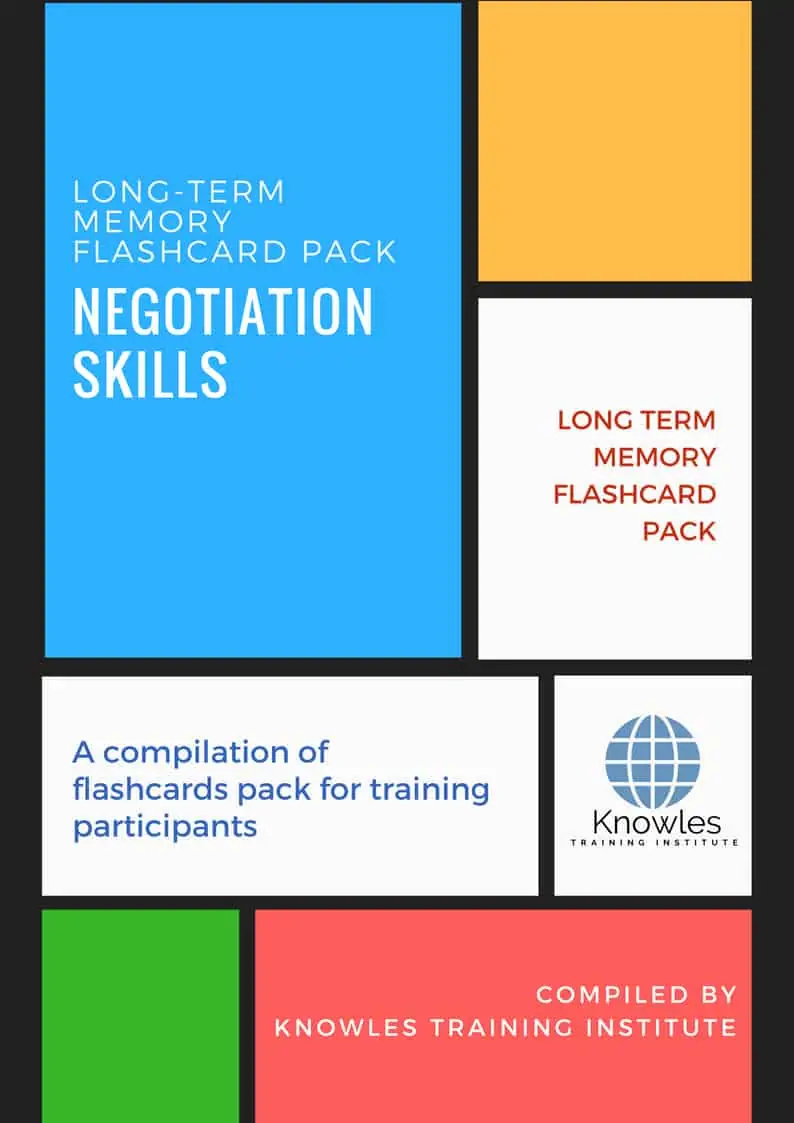
Negotiation Skills E-Learning Course
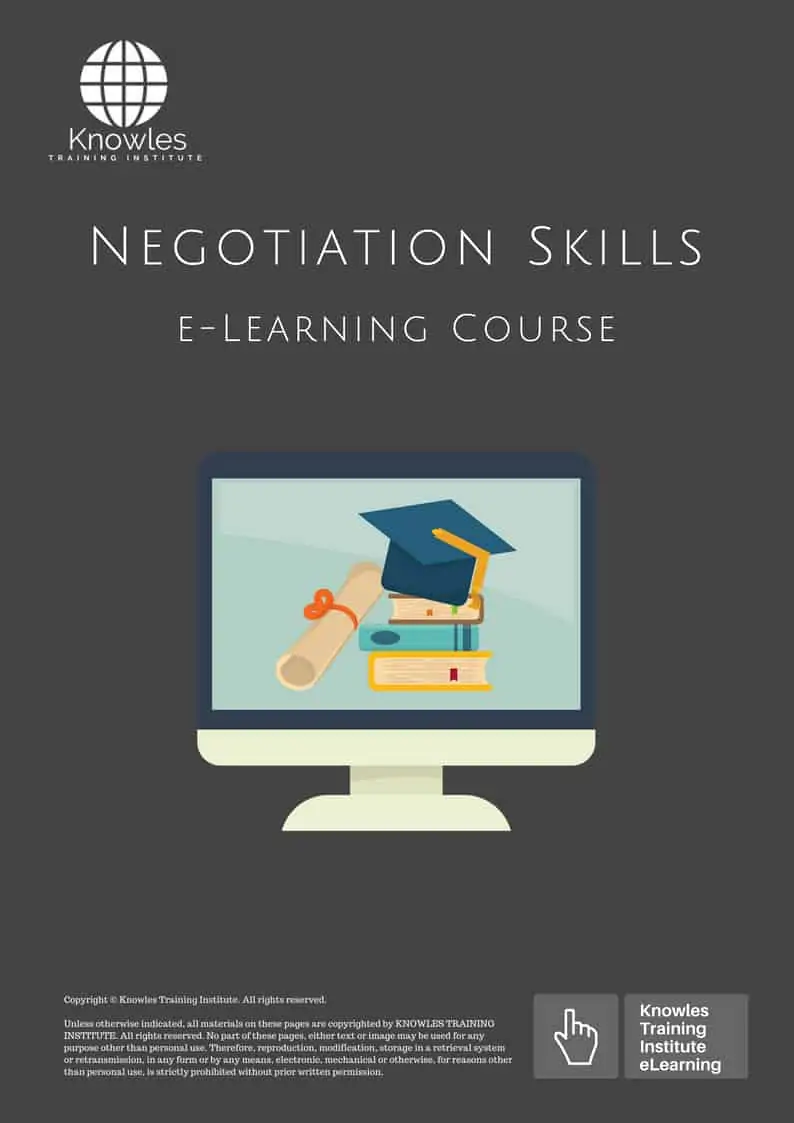
Negotiation Skills Online Video Course
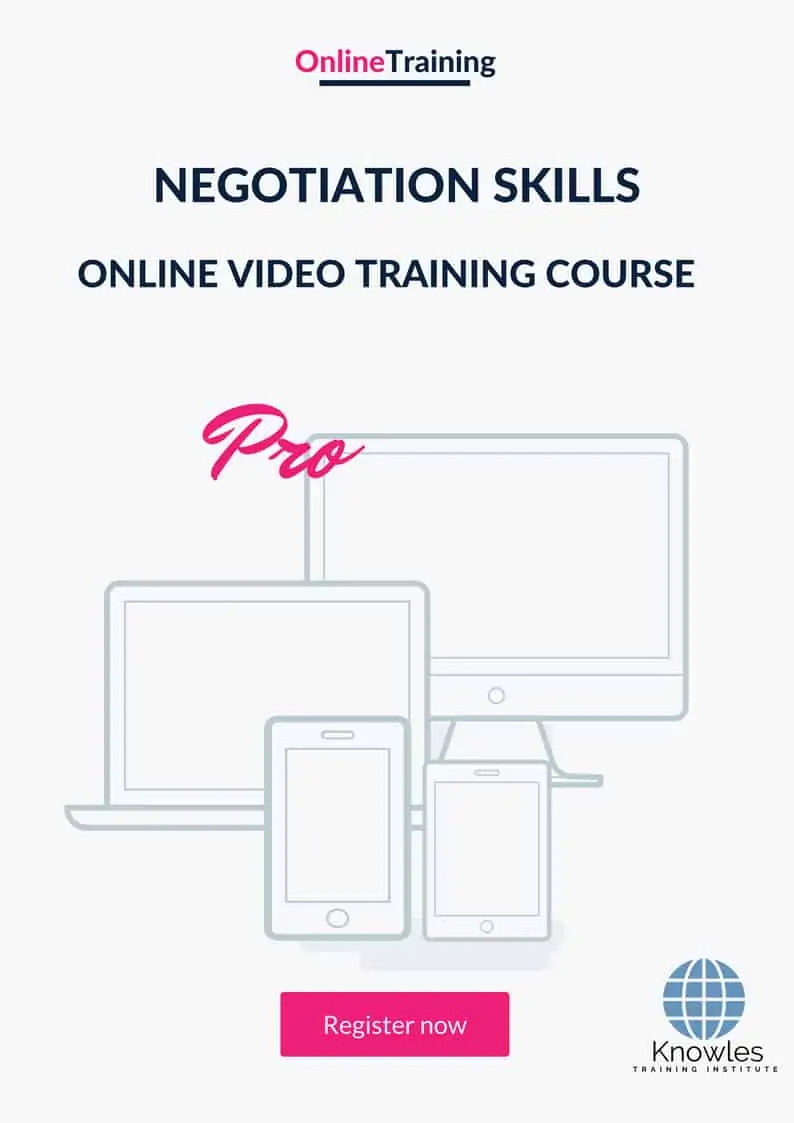
Negotiation Skills Essentials Audiobook
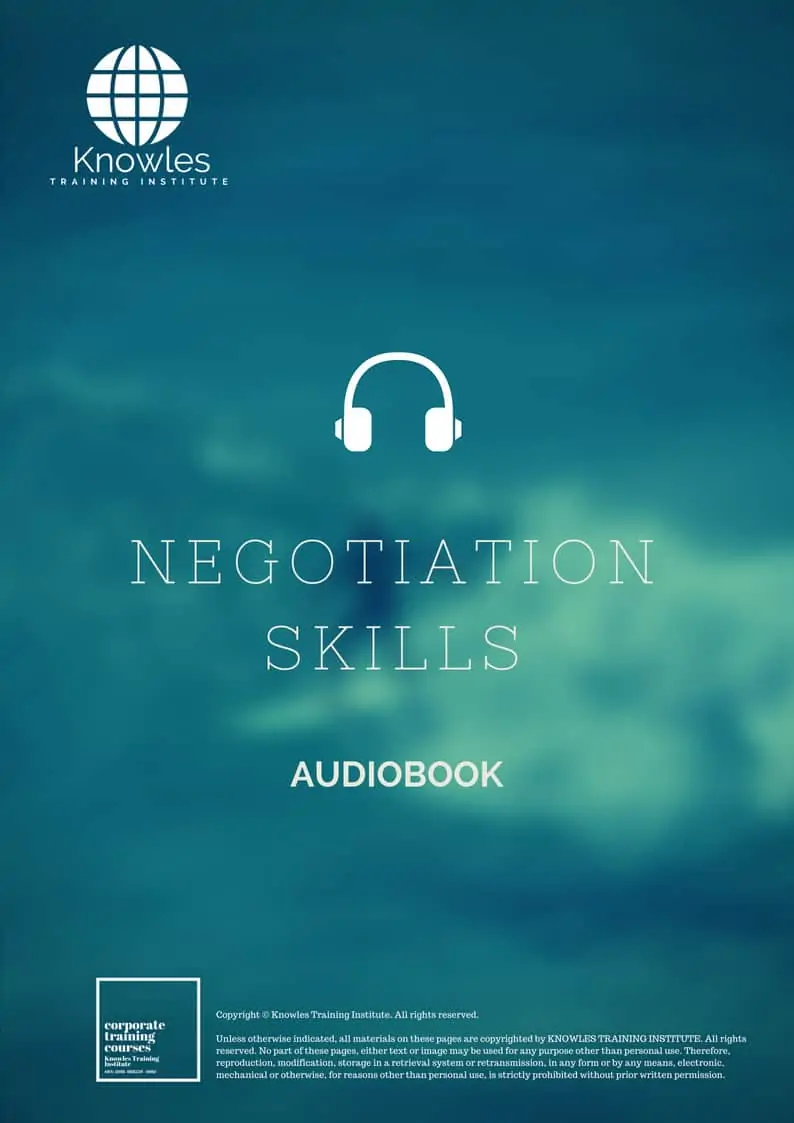
Negotiation Skills Infographics Pack
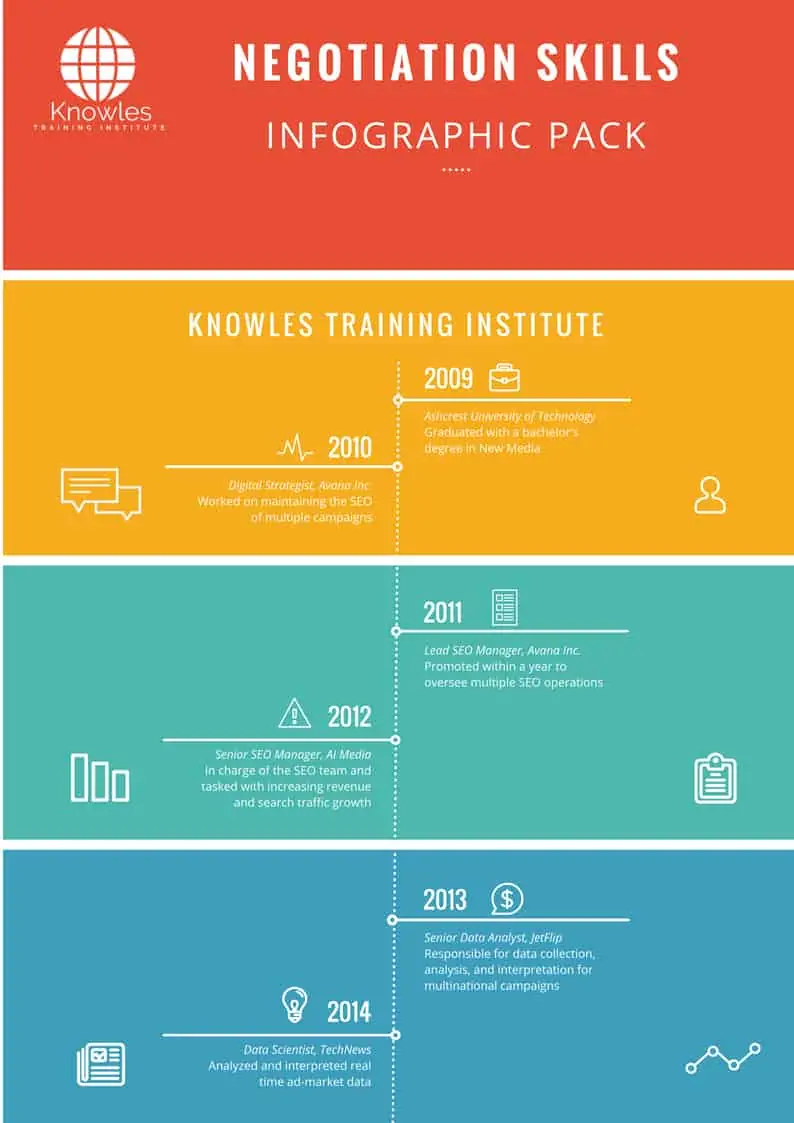
Negotiation Skills Certification
Each course participant will receive a certification of training completion
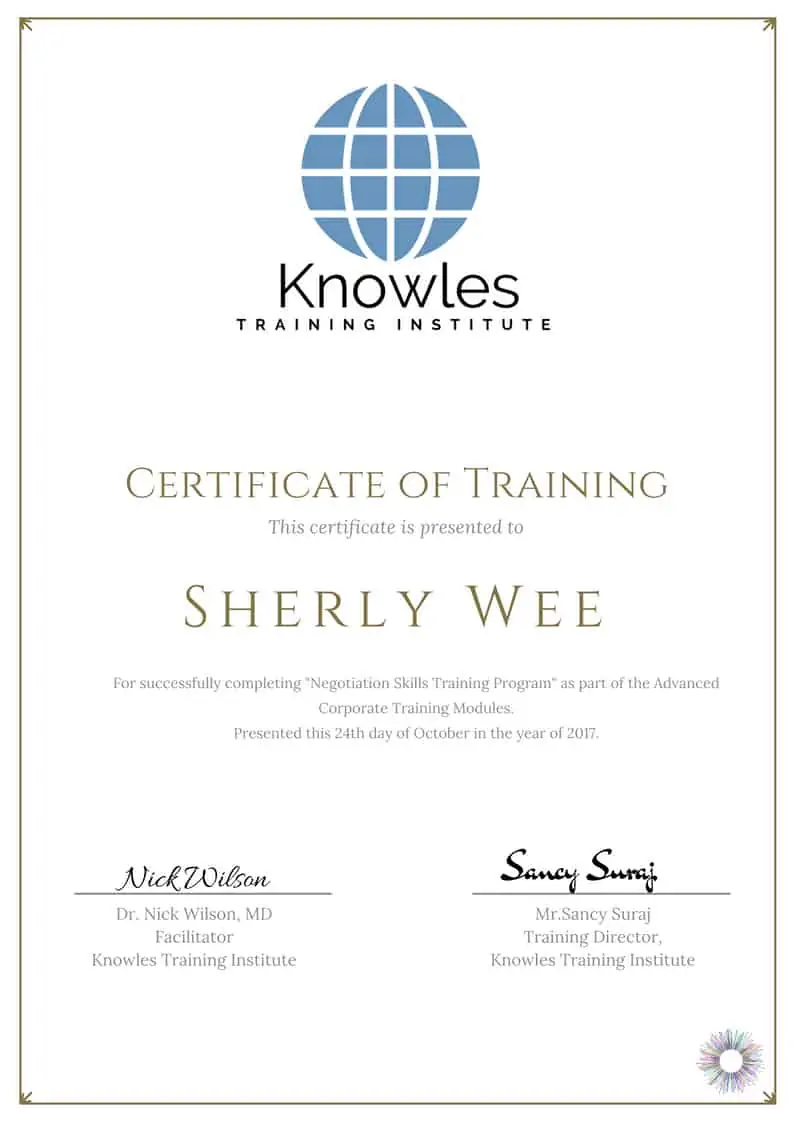
Course Fees
There are 4 pricing options available for this Negotiation Skills training course. Course participants not in Singapore may choose to sign up for our online Negotiation Skills training course.
- SGD 1,334.96 For a 60-minute Lunch Talk Session.
- SGD 584.96 For a Half Day Course Per Participant.
- SGD 884.96 For a 1 Day Course Per Participant.
- SGD 1,184.96 For a 2 Day Course Per Participant.
Discounts available for more than 2 participants.
Post-Training Support: A vast majority of training does not have any effect beyond 120 days. But to work, training has to have a strong pre- and post-training component. Post-training reinforcement consequently helps individuals to recall the understanding and ask questions.
Blended Learning: Learning does not occur in the classroom. Virtually everybody prefers distinct ways of learning. Successful learning should have a multi-channel, multi-modal strategy.
We Understand The Industry: Similarly, we’ve got a profound comprehension of the business, business design, challenges, strategy and the that our participants are in and have designed the courseware to cater to their professional needs.
Course Content: Knowles Training Institute’s material is relevant, of high quality and provide specific learning outputs. As a result, Participants will leave the training course feeling as they have gained a strong understanding and will also be in a position to execute what they have learned sensibly.
Course Development — The workshop modules follow a systematic and logical arrangement. Therefore, this structure helps to ensure that the course material allows the facilitators to deliver the course in a logical arrangement. Consider the subjects as building bricks into learning, our facilitators slowly build towards a comprehensive picture of this entire topic.


Course Enquiries

Fill up the form and we will get back to you in less than 1 working day.
Alternatively, give us a call to have one of our training consultants contact you. Our corporate training courses can be contextualized to meet your organization’s training needs. Leverage on our large pool of professional trainers and consultants for your organization’s training needs.
Office Address: 60 Paya Lebar Rd, #07-54 Paya Lebar Square, Singapore 409051
Office Phone: +65 6714 6663
Email: contact@knowlesti.sg
We Guarantee 100% Privacy. We Respect Your Privacy. Your Information Will Never Be Shared.


